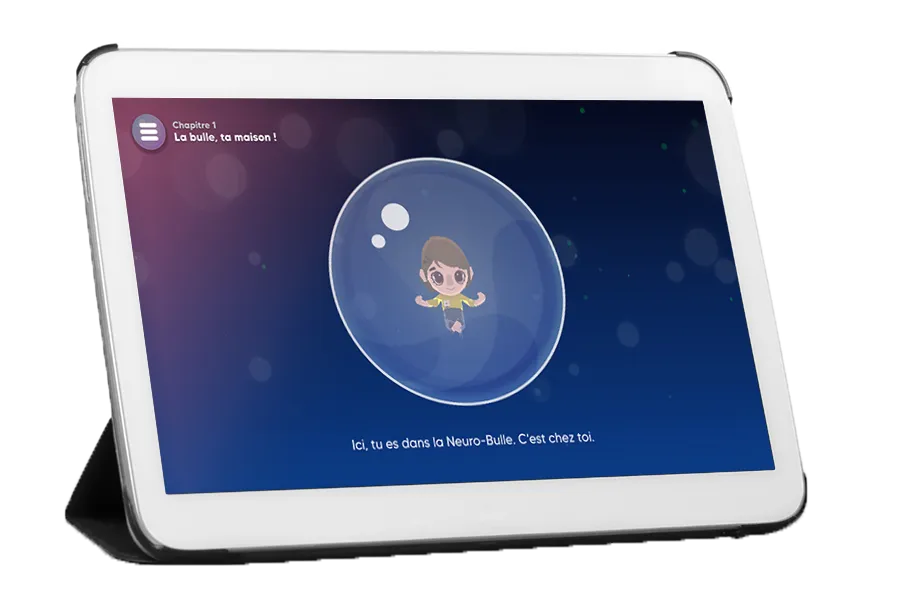In this article, we’ll focus more specifically on speech therapy for children. This remediation professional juggles a number of missions, always with a single objective in mind: to support them in their development. He helps them to communicate, both in terms of expression and comprehension, orally and in writing, facilitating their social and academic integration.
Although speech therapists work with all ages, their role is particularly crucial in supporting young patients. They give the helping hand needed to overcome language and learning disorders, pushing every child to reach their full communicative potential. 💬
What is the role of a speech therapist?
Also known as “logopède” among our Belgian friends or “logopédiste” in Switzerland, the speech therapist has a very broad field of expertise. They play a role in the screening, prevention, diagnosis and treatment of language, communication and learning disorders, as well as swallowing and oral problems. They can treat both children and adults.
This healthcare professional observes, listens and seeks to understand the origins of difficulties in order to offer appropriate support.
What are his areas of expertise?
- Food and orality: yes, you read that right! The speech therapist can help improve chewing, sucking and swallowing. These skills are often the first steps addressed during consultations, as they are crucial to the child’s initial development.
- Oral language: whether to help with pronunciation, enrich vocabulary or make pronunciation more fluid, the speech therapist is on the case! They also help children with stuttering, delayed language learning or articulatory disorders. Beyond words, he helps children interact, share their emotions and thoughts. Some like to call it a “coach” for social interaction.
- Written language: from learning how to write letters to constructing sentences, the speech therapist guides little ones (and older ones too) through the mysteries of writing and reading. He also supports children with dyslexic or dysorthographic disorders.
- Mathematical cognition: although less well-known, this area is also part of his field of intervention: the speech therapist supports the development of mathematical skills, helps structure logical and numerical thinking, often in collaboration with other specialists for a multidisciplinary approach.
Not only does he accompany the child on his linguistic epic, but he’s also there to offer tailor-made follow-up, adapted to each little language adventurer. He’ll know how to guide families towards the most appropriate solutions based on the issues at hand.
✏ Note : wondering if a speech therapist can help with hearing disorders, learning difficulties, ADHD (Attention Deficit Disorder with or without Hyperactivity) or neurological disorders? The answer is a resounding YES! ✨This language expert is there to guide, support and direct you towards the best solutions. Not only does he help develop oral and written language, he’s also the mainstay for improving your child’s communication.
Does your child need to see a speech therapist?
Here are some examples where a speech therapy consultation may be considered:
- Your child is experiencing difficulties at school, particularly in reading, writing or speaking.
- Your child has difficulty pronouncing certain sounds or words.
- You notice a delay in your child’s language development.
- Your child encounters challenges in expressing thoughts and feelings.
- Your child has problems with eating, chewing or swallowing.
- Your child’s teacher or pediatrician shares his or her concerns about written and/or oral communication.
The Fédération Nationale des Orthophonistes (PNO) details the signs that should arouse your suspicions about a potential language disorder in the video “Language disorders: when to consult a speech therapist?” below.
As always: beware of self-diagnosis! If in doubt, seek the advice of your doctor. 🩺
At what age is it recommended to consult a speech therapist?
There’s no set age for consulting him. However, as soon as you notice language or communication difficulties, even from an early age, it may be wise to seek your doctor’s advice. And, if he confirms your doubts, to make an appointment with a speech therapist.
How to choose a speech therapist for your child
Choosing a speech therapist isn’t always easy: you need someone you can trust, who is competent, with whom your child will feel comfortable, and whom he or she will enjoy seeing periodically. Talk to people around you, listen to recommendations and trust your intuition 😉
- Recommendations: recommendations from friends and family or healthcare professionals can be a reassuring first step. Word-of-mouth, particularly from pediatricians, teachers and other parents, is an effective method of finding a competent professional.
- Specialization: every speech therapist has his or her own specialty or specialties (voice, speech, communication, learning disorders, etc.). Make sure the professional has experience in the area or areas that concern your child.
- Proximity: when possible, opt for a professional close to home, to facilitate travel and make visits less restrictive.
- The right feeling: don’t hesitate to get in touch with a professional, ask questions, and express your needs and expectations. During this initial contact, the speech therapist should ask you a number of questions to better understand your child’s situation and explain his or her working methods.
✏ Note : if no one can advise you, or if the recommended professional is not suitable for you,The Ameli online directory lists all the liberal speech therapists approved by the Assurance Maladie. ➡️ Find a conventioned speech therapist
📅I can’t get an appointment with a speech therapist?
In some French departments, the quest for an appointment can be a veritable obstacle course, and for good reason: we’re facing a notable shortage of these experts. It’s not unusual to wait several months for an appointment.
If you find yourself in this situation, there are digital platforms that can help:
- Allo Ortho is a site that provides information on the prevention of disorders falling within the scope of speech therapists and indications of the need to consult one. The platform also puts you in touch by telephone with a regulating speech therapist, who is responsible for determining whether the disorders observed require a consultation.
- Inzee.care is a platform connecting patients and healthcare professionals. In particular, the site enables users to register on a joint waiting list of member speech therapists, in order to obtain an appointment as quickly as possible.
First appointment: what to expect
The first appointment is a key step. It’s a time for exchange, discovery and listening.
An open discussion
💬 The expert will take the time to understand, observe and discuss with you and your child, in order to understand his or her development, all in a caring way.
Initially, the speech therapist takes what is known as anamnesis, i.e. asks questions about the reasons for the consultation, the child’s difficulties, development, medical history and environment. This open conversation is also an opportunity to express your observations and concerns.
The observation phase
When the speech therapist enters the scene, he doesn’t just chat: he observes, interacts, and looks for potential flaws in the child’s language. Don’t be surprised if he wants to examine the inside of his mouth: this observation is useful for identifying any anomalies or aspects that need special attention, such as the tongue brake, the state of the teeth, or the structure of the jaw.
Planning and adaptation
At the end of this appointment, the speech therapist proposes a tailor-made action plan for your child. He/she may also suggest tests adapted to the request and his/her age to better understand the child’s profile and plan the eventual course of care.
Session duration
It generally lasts between 30 minutes and an hour, depending on the needs and age of your little protégé.
How many sessions will your child need?
Every child is unique, and so will his or her speech therapy journey. After the initial assessment, the speech therapist will be able to give you an estimate of the number of sessions required. For some, a dozen sessions will suffice, while for others follow-up will take several years. But rest assured: each step is a victory towards better communication!
✏ Note : your role is essential! Encourage your child, congratulate his or her progress and don’t hesitate to talk regularly with the speech therapist about exercises to practice at home. Your support and involvement are part of the key to his success.

Is a speech therapist’s consultation reimbursed by Social Security?
Speech therapy sessions are reimbursed up to 60% by Social Security. But please note: to qualify, sessions must be prescribed by your attending physician. The remainder may be reimbursed by your mutual health insurance company (ask them for details 😉).
Language therapist training: a path of excellence
Becoming a speech therapist means first and foremost committing to a solid, comprehensive training program. This includes a rigorous university curriculum, often at Master’s level, enhanced by practical internships to perfect clinical skills. Parents are reassured. 😊 It then involves ongoing training throughout one’s career, to keep continually up to date on new care tools, but also on new regulations.
What studies do you need to become a speech therapist?
In France, studies to become a speech-language pathologist extend over five years at a Centre de Formation Universitaire en Orthophonie (CFUO) attached to a medical faculty. The course leads to the Certificat de Capacité d’Orthophoniste (CCO), equivalent to a Master’s degree. These studies are regulated, and are subject to a strict numerus clausus.
The theoretical aspect includes a solid foundation of knowledge in linguistics, psychology and health. Training also includes subjects such as anatomy, acoustic physics and phonation.
Students complete field placements in elementary school, nurseries, EHPADs, and with other speech therapists, learning about various fields such as hearing, disability and neurology.
Continuous learning
Throughout their careers, speech therapists have the opportunity to specialize further through continuing education. They can also move into related fields of research, such as language science, to further enrich their skills and knowledge.
The Babaoo recap!
The speech therapist is the indispensable ally for children who encounter a language or communication development disorder. From assessment to regular support, this remediation professional guides children and their families with adapted methods and a personalized approach. The choice of speech therapist, the first appointment, and parental involvement are all key stages in a successful and fulfilling journey for your child. 🌈





